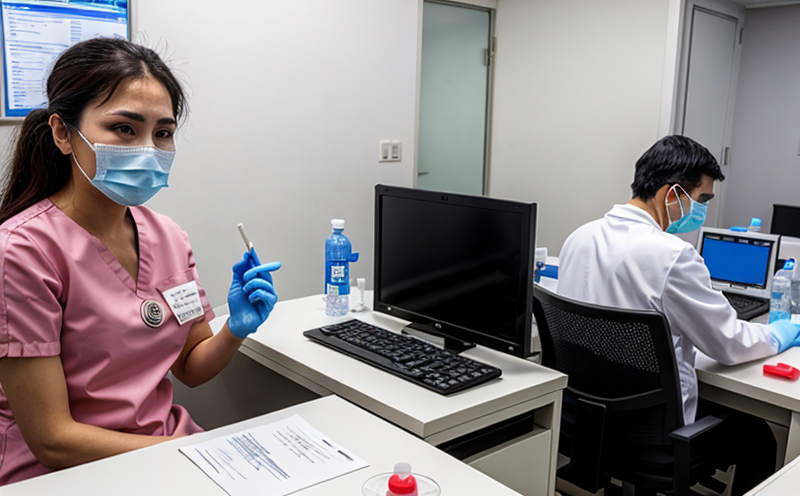Arenavirus Serological Testing in Rodent Populations
The Arenaviridae family of viruses includes several members that are significant public health concerns. Arenaviruses such as Lassa fever virus, lymphocytic choriomeningitis virus (LCMV), and others can be transmitted to humans through contact with infected rodents or their excreta. Serological testing plays a crucial role in the diagnosis and monitoring of these viruses in rodent populations before they pose a threat to human health.
The Arenavirus serologic test is designed to detect antibodies against arenaviruses in rodents, particularly focusing on LCMV as it is one of the most commonly studied arenaviruses. The primary objective is to identify the presence or absence of specific IgG and IgM antibodies that indicate past or current infections with these viruses.
Our service utilizes a multiplex ELISA (Enzyme-Linked Immunosorbent Assay) platform, which allows for simultaneous detection of multiple antibody classes against various arenaviruses. This method provides high sensitivity and specificity, ensuring accurate results even in low-abundance samples. The assay is validated using reference materials from reputable international standards such as the World Health Organization (WHO).
The test process involves several steps: collection of blood samples from rodents, preparation of serum, and subsequent incubation with antigen-coated microtiter plates. Following incubation, the plates are washed to remove unbound antibodies, and a detection antibody conjugated to an enzyme is added. The enzyme-labeled antibodies bind specifically to any bound target antigens, allowing for visualization through color change due to the substrate reaction.
The results from this assay provide critical information about the prevalence of infection within rodent populations in specific geographical areas or habitats. This data is essential for public health officials and wildlife biologists who need to assess risk factors associated with arenavirus transmission. By identifying infected rodents early, preventive measures can be implemented to minimize the spread of these viruses.
The accuracy and reliability of our testing service ensure that decision-makers have trustworthy data upon which to base their actions. Our team employs advanced laboratory techniques and follows strict protocols to maintain consistency in results across different samples and test runs. This ensures that any detected antibodies are genuine and not due to cross-reactivity or other artifacts.
The importance of this service cannot be overstated, especially considering the increasing number of emerging infectious diseases worldwide. Early detection of these viruses through serological testing can lead to more effective interventions, including vaccination campaigns, vector control programs, and education initiatives aimed at reducing human exposure risks.
Why It Matters
The significance of detecting Arenavirus infections in rodent populations cannot be emphasized enough. These viruses have the potential to cause severe illnesses in humans if left unchecked. By identifying infected rodents early, public health authorities can take proactive measures to prevent outbreaks and protect communities.
Our serological testing service offers several benefits over other diagnostic methods like PCR (Polymerase Chain Reaction). While PCR provides direct detection of viral nucleic acids, it requires viable virus particles or RNA for accurate results. In contrast, our serologic test detects antibodies produced by the host immune system, which can persist long after the infection has cleared.
Moreover, our service helps in understanding the dynamics of arenavirus circulation within rodent populations over time. This information is vital for tracking changes in prevalence rates and identifying potential hotspots where interventions might be needed most urgently.
The ability to monitor trends in seroprevalence also aids researchers studying the natural history of these viruses, contributing valuable data towards developing better vaccines and treatments. Additionally, our testing can help inform conservation efforts by highlighting areas with high rodent populations that may pose greater risks for zoonotic disease transmission.
Eurolab Advantages
At Eurolab, we pride ourselves on offering comprehensive and reliable services tailored to meet the needs of our clients across various sectors. For those involved in clinical and healthcare testing related to virology and serology, our expertise lies in providing precise and accurate Arenavirus serologic tests.
Our state-of-the-art laboratories are equipped with cutting-edge technology and employ highly trained professionals who adhere strictly to international standards like ISO 17025. This ensures that every aspect of the testing process—from sample preparation to result interpretation—is conducted under controlled conditions, yielding consistent and reproducible results.
We understand the importance of timely delivery in healthcare settings where rapid turnaround times are crucial for effective patient management. Our dedicated teams work efficiently to complete tests promptly while maintaining high quality standards. Clients can expect fast delivery times without compromising on accuracy or reliability.
Moreover, our commitment extends beyond just performing tests; we also offer consultative services designed specifically around your unique requirements. Whether you need assistance interpreting results or advice on implementing control measures based on test outcomes, our experts are here to provide guidance at every step of the way.
Quality and Reliability Assurance
The quality assurance program at Eurolab is designed to ensure that all tests performed meet the highest standards set by international bodies. Our adherence to ISO 17025 guarantees that our laboratories maintain strict quality control measures throughout every phase of testing.
To further enhance reliability, we participate in proficiency testing programs organized by reputable organizations such as the College of American Pathologists (CAP) and the European Federation for Quality Assurance in Laboratory Medicine (EFQA). These external validations provide independent verification of our analytical capabilities and help us identify areas for continuous improvement.
In addition to these formal assessments, internal audits are conducted regularly to monitor compliance with standard operating procedures. External reviews by independent experts also contribute towards maintaining robust quality assurance practices within the laboratory environment.
Our commitment to excellence does not end there; we invest heavily in staff training and development programs aimed at keeping our personnel updated on the latest advancements in diagnostic technologies and methodologies. Regular updates ensure that our team remains proficient in handling complex samples and interpreting nuanced data accurately.





